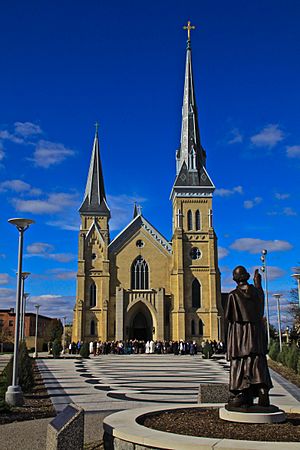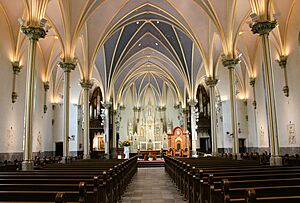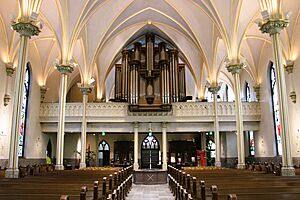Cathedral of Saint Andrew (Grand Rapids, Michigan) facts for kids
Quick facts for kids Cathedral of Saint Andrew |
|
|---|---|

East façade on the Piazza Secchia
|
|
| 42°57′29″N 85°40′02″W / 42.95804°N 85.66713°W | |
| Location | 215 Sheldon Blvd. SE Grand Rapids, Michigan |
| Country | United States |
| Denomination | Roman Catholic Church |
| History | |
| Founded | 1833 |
| Architecture | |
| Style | Gothic Revival |
| Completed | 1876 |
| Specifications | |
| Height | 192 feet (59 m) |
| Materials | Limestone |
| Tenor bell weight | 213 |
| Administration | |
| Diocese | Grand Rapids |
The Cathedral of Saint Andrew is an important Catholic church. It is located in Grand Rapids, Michigan, in the United States. This church is the main church for the Catholic Diocese of Grand Rapids.
History
Early Beginnings
The story of Saint Andrew's began a long time ago. In 1833, a priest named Reverend Frederic Baraga started St. Mary's Church. He built a small church, a rectory (where priests live), and a school. These buildings were on the west side of the Grand River. The people who went to this church were Native Americans.
Two years later, Reverend Andreas Viszoczky became the first official pastor. As the town of Grand Rapids grew, many Native Americans moved away. Father Viszoczky then built a new church on Monroe Street. He named this church St. Andrew. It was made from Grand River limestone and finished in 1850.
Becoming a Cathedral
Grand Rapids kept growing, and so did the church community. Soon, a bigger church was needed. In 1875, construction began on the current church building. It was finished just one year later, in 1876.
On May 19, 1882, Pope Leo XIII created the Diocese of Grand Rapids. A diocese is a special area managed by a bishop. The first bishop of this new diocese was Henry J. Richter. He chose Saint Andrew's as his main church, or "cathedral." He became bishop there on April 22, 1883.
Changes Over Time
In 1901, lightning struck the cathedral. A fire then destroyed part of the building. But the church was rebuilt and made even larger. You can still see some charred marks on the wooden beams above the ceiling from that fire!
In the 1950s, a television studio was built inside the cathedral. This allowed a weekly Sunday Mass to be shown on TV. Today, the cameras are updated for digital broadcasts. The cathedral was expanded again between 1961 and 1963. During this time, the St. Ambrose Chapel wing was added. A street nearby was closed to create a green space.
More big changes happened from 1979 to 1980. The altar was moved closer to the people. A special area for priests to get ready was also created. Another major update took place from 1997 to 2000. A baptismal pool was added. The beautiful stained glass windows were cleaned and repaired. The Stations of the Cross (pictures showing Jesus's journey) were also restored.
The current pipe organ was put in place in 2002. In 2009, the front entrance of the cathedral was updated. A new outdoor area called the Piazza Secchia was built. It looks like a famous plaza in Rome designed by Michelangelo.
See also
 In Spanish: Catedral de San Andrés (Grand Rapids) para niños
In Spanish: Catedral de San Andrés (Grand Rapids) para niños
- List of churches in the Roman Catholic Diocese of Grand Rapids
- List of Catholic cathedrals in the United States
- List of cathedrals in the United States
 | Georgia Louise Harris Brown |
 | Julian Abele |
 | Norma Merrick Sklarek |
 | William Sidney Pittman |




